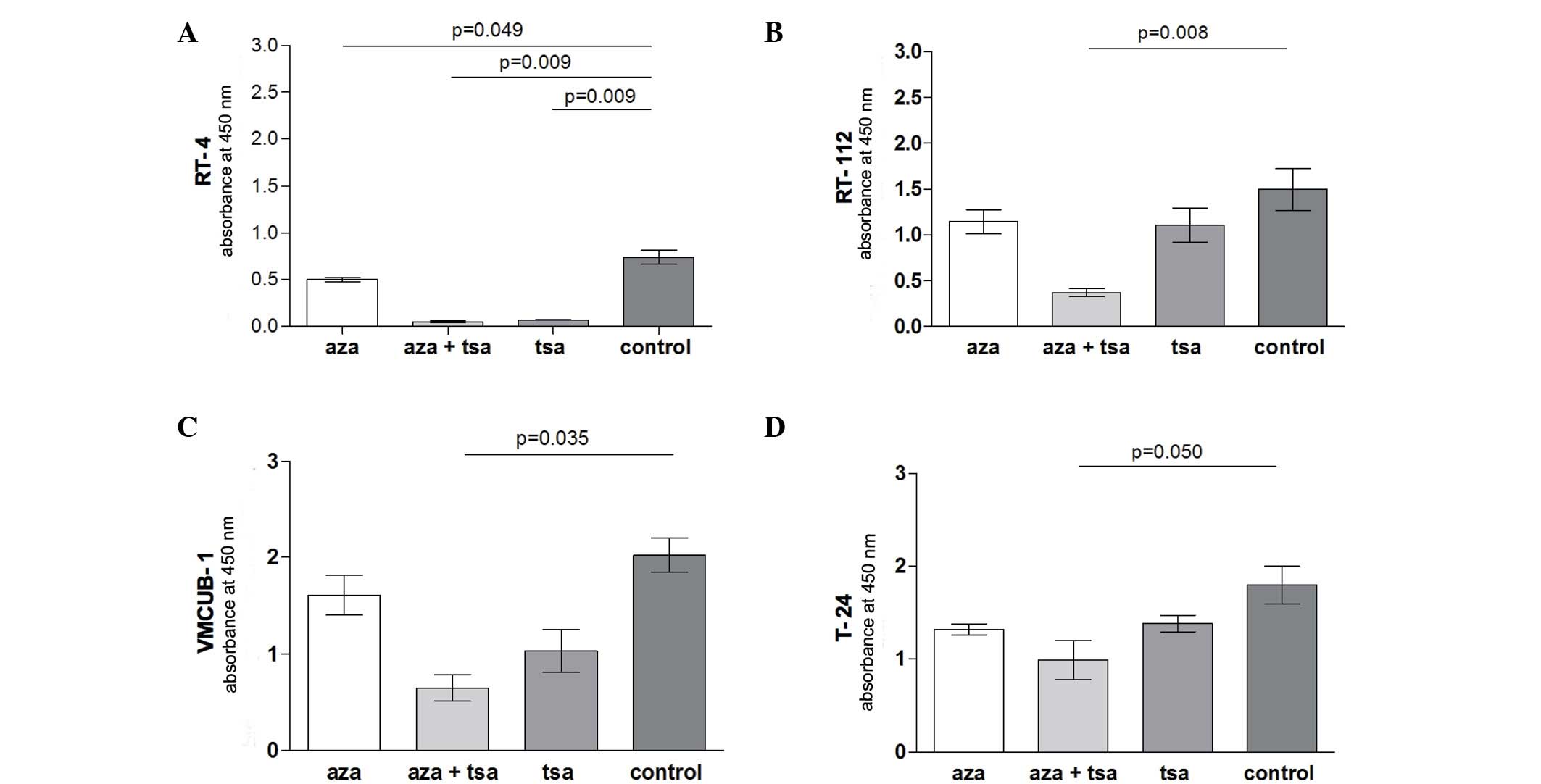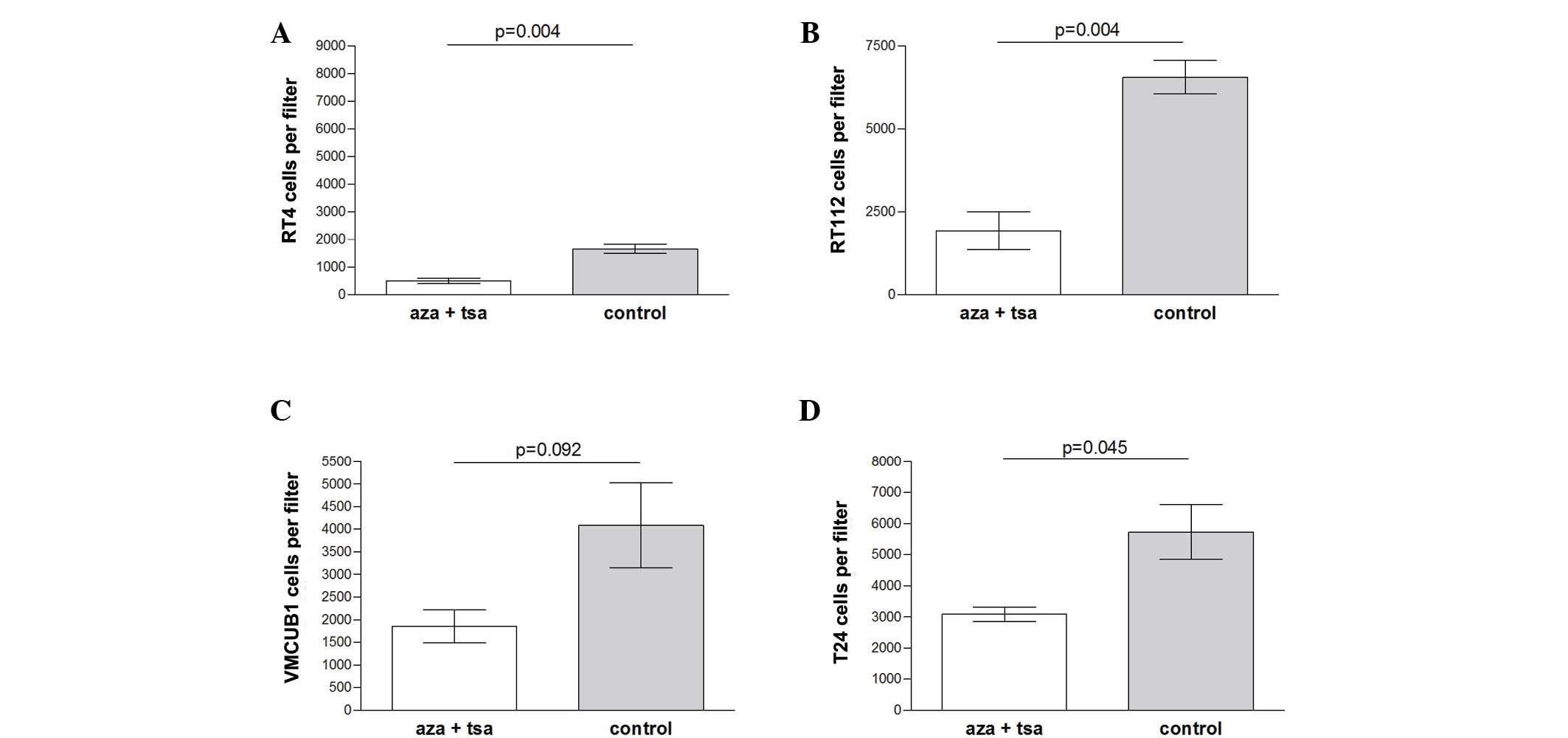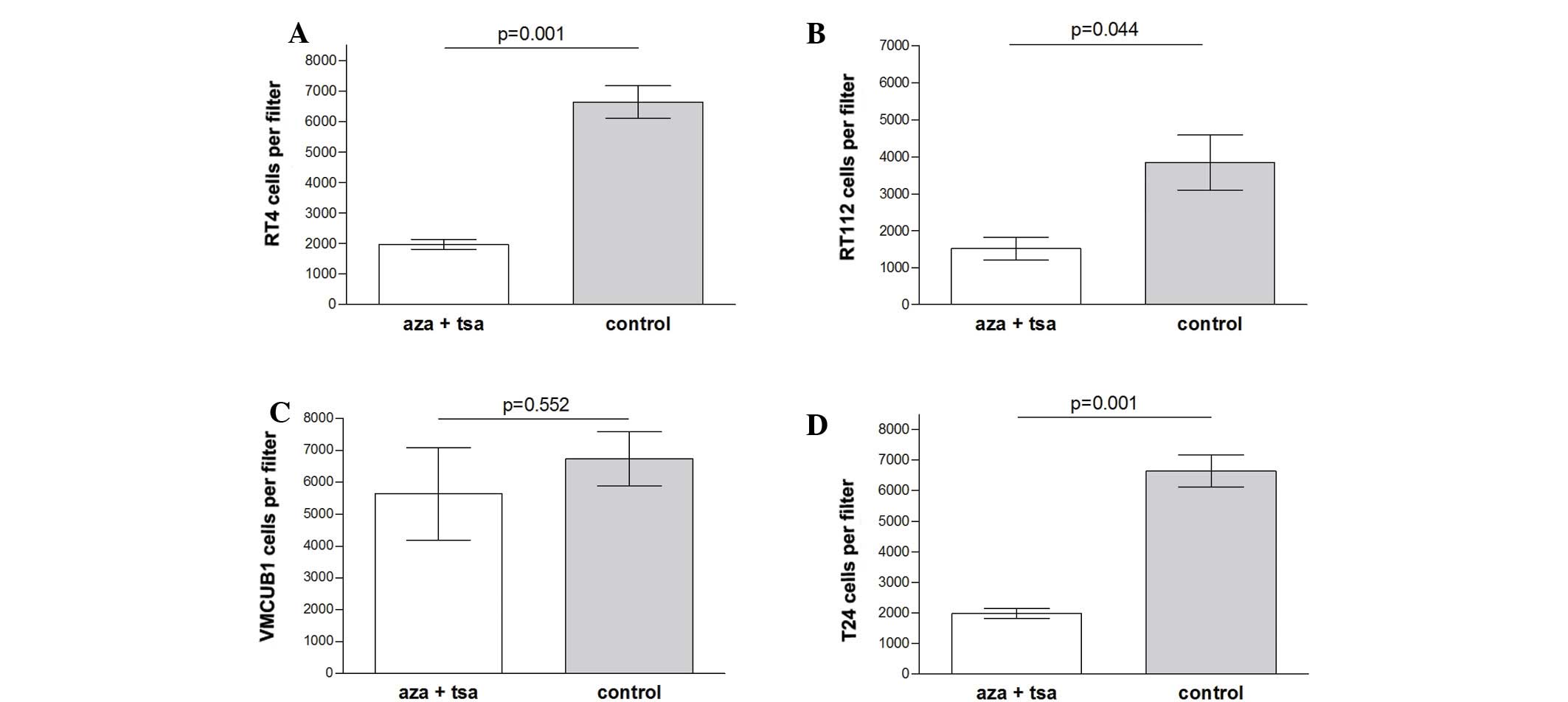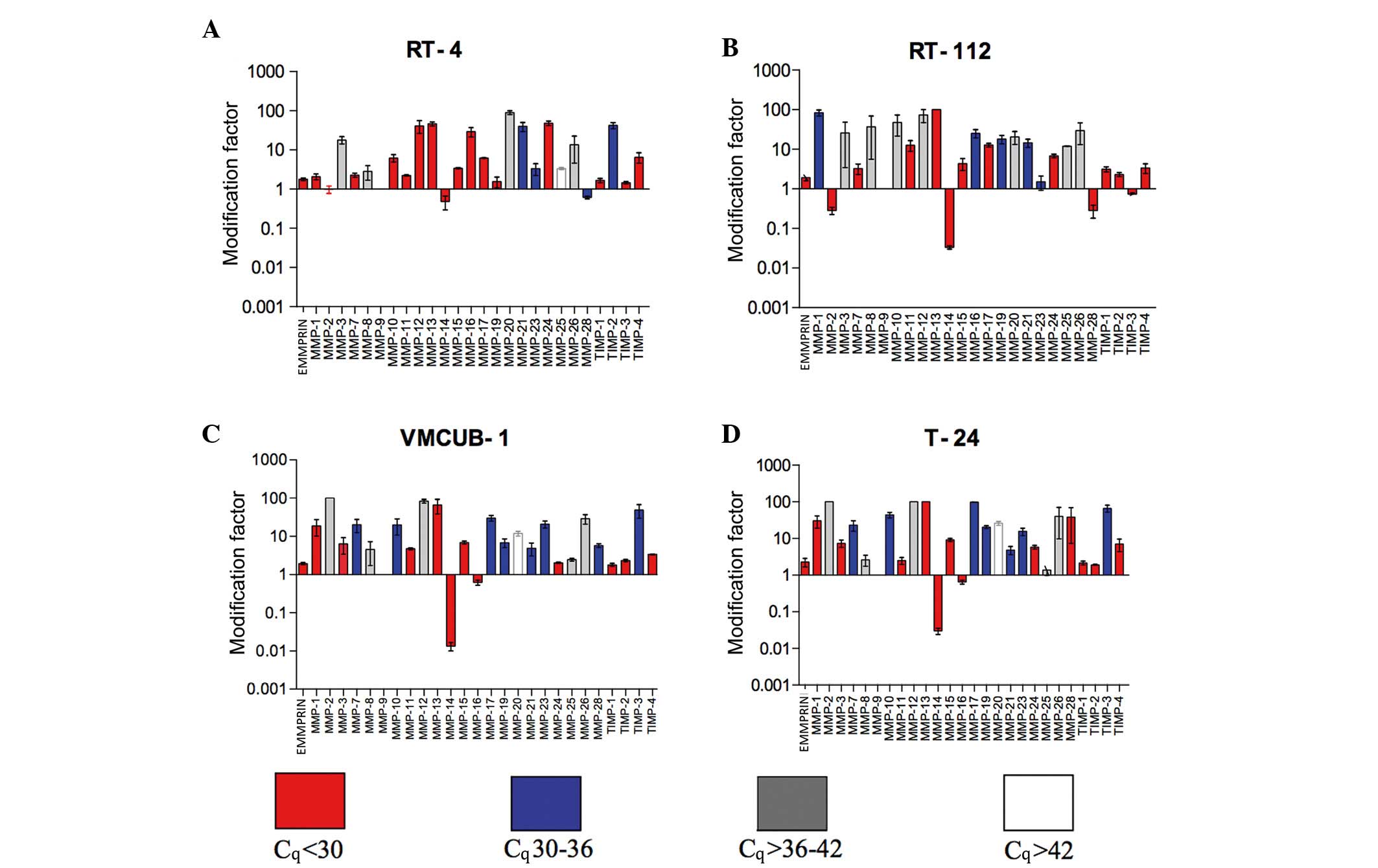|
1
|
Kanwal R and Gupta S: Epigenetic
modifications in cancer. Clin Genet. 81:303–311. 2012. View Article : Google Scholar : PubMed/NCBI
|
|
2
|
Ades L and Santini V: Hypomethylating
agents and chemotherapy in MDS. Best Pract Res Clin Haematol.
26:411–419. 2013. View Article : Google Scholar : PubMed/NCBI
|
|
3
|
Kim TK, Gore SD and Zeidan AM: Epigenetic
therapy in acute myeloid leukemia: Current and future directions.
Semin Hematol. 52:172–183. 2015. View Article : Google Scholar : PubMed/NCBI
|
|
4
|
Boumber Y and Issa JP: Epigenetics in
cancer: What's the future? Oncology (Williston Park). 25:220–226,
228. 2011.PubMed/NCBI
|
|
5
|
Montero AJ, Diaz-Montero CM, Mao L,
Youssef EM, Estecio M, Shen L and Issa JP: Epigenetic inactivation
of EGFR by CpG island hypermethylation in cancer. Cancer Biol Ther.
5:1494–1501. 2006. View Article : Google Scholar : PubMed/NCBI
|
|
6
|
Bauman J, Verschraegen C, Belinsky S,
Muller C, Rutledge T, Fekrazad M, Ravindranathan M, Lee SJ and
Jones D: A phase I study of 5-azacytidine and erlotinib in advanced
solid tumor malignancies. Cancer Chemother Pharmacol. 69:547–554.
2012. View Article : Google Scholar : PubMed/NCBI
|
|
7
|
Vigushin DM, Ali S, Pace PE, Mirsaidi N,
Ito K, Adcock I and Coombes RC: Trichostatin A is a histone
deacetylase inhibitor with potent antitumor activity against breast
cancer in vivo. Clin Cancer Res. 7:971–976. 2001.PubMed/NCBI
|
|
8
|
Ailenberg M and Silverman M: Trichostatin
A-histone deacetylase inhibitor with clinical therapeutic
potential-is also a selective and potent inhibitor of gelatinase A
expression. Biochem Biophys Res Commun. 298:110–115. 2002.
View Article : Google Scholar : PubMed/NCBI
|
|
9
|
Christman JK: 5-Azacytidine and
5-aza-3′-deoxycytidine as inhibitors of DNA methylation:
mechanistic studies and their implications for cancer therapy.
Oncogene. 21:5483–5495. 2002. View Article : Google Scholar : PubMed/NCBI
|
|
10
|
Ferguson AT, Lapidus RG, Baylin SB and
Davidson NE: Demethylation of the estrogen receptor gene in
estrogen receptor-negative breast cancer cells can reactivate
estrogen receptor gene expression. Cancer Res. 55:2279–2283.
1995.PubMed/NCBI
|
|
11
|
Yuecheng Y, Hongmei L and Xiaoyan X:
Clinical evaluation of E-cadherin expression and its regulation
mechanism in epithelial ovarian cancer. Clin Exp Metastasis.
23:65–74. 2006. View Article : Google Scholar : PubMed/NCBI
|
|
12
|
Kang SH, Choi HH, Kim SG, Jong HS, Kim NK,
Kim SJ and Bang YJ: Transcriptional inactivation of the tissue
inhibitor of metalloproteinase-3 gene by dna hypermethylation of
the 3′-CpG island in human gastric cancer cell lines. Int J Cancer.
86:632–635. 2000. View Article : Google Scholar : PubMed/NCBI
|
|
13
|
Izawa JI, Slaton JW, Kedar D, Karashima T,
Perrotte P, Czerniak B, Grossman HB and Dinney CP: Differential
expression of progression-related genes in the evolution of
superficial to invasive transitional cell carcinoma of the bladder.
Oncol Rep. 8:9–15. 2001.PubMed/NCBI
|
|
14
|
Hara I, Miyake H, Hara S, Arakawa S and
Kamidono S: Significance of matrix metalloproteinases and tissue
inhibitors of metalloproteinase expression in the recurrence of
superficial transitional cell carcinoma of the bladder. J Urol.
165:1769–1772. 2001. View Article : Google Scholar : PubMed/NCBI
|
|
15
|
National Institute for Health and Care
Excellence: Bladder cancer: Diagnosis and management. NICE
Guideline 2. National Collaborating Centre for Cancer (Cardiff).
2015.https://www.nice.org.uk/guidance/ng2/resources/bladder-cancer-diagnosis-and-management-of-bladder-cancer-51036766405Accessed.
June 10–2016
|
|
16
|
Elmamoun MH, Christmas TJ and Woodhouse
CR: Destruction of the bladder by single dose Mitomycin C for
low-stage transitional cell carcinoma (TCC) - avoidance,
recognition, management and consent. BJU Int. 113:E34–E38. 2014.
View Article : Google Scholar : PubMed/NCBI
|
|
17
|
Pommier JD, Ben Lasfar N, Van Grunderbeeck
N, Burdet C, Laouénan C, Rioux C, Pierre-Audigier C, Meybeck A,
Choudat L, Benchikh A, et al: Complications following intravesical
bacillus Calmette-Guerin treatment for bladder cancer: A case
series of 22 patients. Infect Dis (Lond). 47:725–731. 2015.
View Article : Google Scholar : PubMed/NCBI
|
|
18
|
Livak KJ and Schmittgen TD: Analysis of
relative gene expression data using real-time quantitative PCR and
the 2(−Delta Delta C(T)) Method. Methods. 25:402–408. 2001.
View Article : Google Scholar : PubMed/NCBI
|
|
19
|
Karam JA, Fan J, Stanfield J, Richer E,
Benaim EA, Frenkel E, Antich P, Sagalowsky AI, Mason RP and Hsieh
JT: The use of histone deacetylase inhibitor FK228 and DNA
hypomethylation agent 5-azacytidine in human bladder cancer
therapy. Int J Cancer. 120:1795–1802. 2007. View Article : Google Scholar : PubMed/NCBI
|
|
20
|
Cecconi D, Donadelli M, Dalla Pozza E,
Rinalducci S, Zolla L, Scupoli MT, Righetti PG, Scarpa A and
Palmieri M: Synergistic effect of trichostatin A and
5-aza-3′-deoxycytidine on growth inhibition of pancreatic endocrine
tumour cell lines: A proteomic study. Proteomics. 9:1952–1966.
2009. View Article : Google Scholar : PubMed/NCBI
|
|
21
|
Couillard J, Demers M, Lavoie G and
St-Pierre Y: The role of DNA hypomethylation in the control of
stromelysin gene expression. Biochem Biophys Res Commun.
342:1233–1239. 2006. View Article : Google Scholar : PubMed/NCBI
|
|
22
|
Sato N, Maehara N, Su GH and Goggins M:
Effects of 5-aza-3′-deoxycytidine on matrix metalloproteinase
expression and pancreatic cancer cell invasiveness. J Natl Cancer
Inst. 95:327–330. 2003. View Article : Google Scholar : PubMed/NCBI
|
|
23
|
Shukeir N, Pakneshan P, Chen G, Szyf M and
Rabbani SA: Alteration of the methylation status of tumor-promoting
genes decreases prostate cancer cell invasiveness and tumorigenesis
in vitro and in vivo. Cancer Res. 66:9202–9210. 2006.
View Article : Google Scholar : PubMed/NCBI
|
|
24
|
Chen CL, Sung J, Cohen M, Chowdhury WH,
Sachs MD, Li Y, Lakshmanan Y, Yung BY, Lupold SE and Rodriguez R:
Valproic acid inhibits invasiveness in bladder cancer but not in
prostate cancer cells. J Pharmacol Exp Ther. 319:533–542. 2006.
View Article : Google Scholar : PubMed/NCBI
|
|
25
|
Kinoshita T, Sato H, Okada A, Ohuchi E,
Imai K, Okada Y and Seiki M: TIMP-2 promotes activation of
progelatinase A by membrane-type 1 matrix metalloproteinase
immobilized on agarose beads. J Biol Chem. 273:16098–16103. 1998.
View Article : Google Scholar : PubMed/NCBI
|
|
26
|
Devy L, Huang L, Naa L, Yanamandra N,
Pieters H, Frans N, Chang E, Tao Q, Vanhove M, Lejeune A, et al:
Selective inhibition of matrix metalloproteinase-14 blocks tumor
growth, invasion, and angiogenesis. Cancer Res. 69:1517–1526. 2009.
View Article : Google Scholar : PubMed/NCBI
|
|
27
|
Itoh Y and Seiki M: MT1-MMP: A potent
modifier of pericellular microenvironment. J Cell Physiol. 206:1–8.
2006. View Article : Google Scholar : PubMed/NCBI
|
|
28
|
Leeman MF, Curran S and Murray GI: The
structure, regulation, and function of human matrix
metalloproteinase-13. Crit Rev Biochem Mol Biol. 37:149–66. 2002.
View Article : Google Scholar : PubMed/NCBI
|
|
29
|
Kitagawa Y, Kunimi K, Ito H, Sato H,
Uchibayashi T, Okada Y, Seiki M and Namiki M: Expression and tissue
localization of membrane-types 1, 2, and 3 matrix
metalloproteinases in human urothelial carcinomas. J Urol.
160:1540–1545. 1998. View Article : Google Scholar : PubMed/NCBI
|
|
30
|
Moon JW, Choi JH, Lee SK, Lee YW, Lee JO,
Kim N, Lee HJ, Seo JS, Kim J, Kim HS, et al: Promoter
hypermethylation of membrane type 3 matrix metalloproteinase is
associated with cell migration in colorectal adenocarcinoma. Cancer
Genet. 208:261–270. 2015. View Article : Google Scholar : PubMed/NCBI
|
|
31
|
Baker AH, George SJ, Zaltsman AB, Murphy G
and Newby AC: Inhibition of invasion and induction of apoptotic
cell death of cancer cell lines by overexpression of TIMP-3. Br J
Cancer. 79:1347–1355. 1999. View Article : Google Scholar : PubMed/NCBI
|
|
32
|
Fata JE, Leco KJ, Voura EB, Yu HY,
Waterhouse P, Murphy G, Moorehead RA and Khokha R: Accelerated
apoptosis in the Timp-3-deficient mammary gland. J Clin Invest.
108:831–841. 2001. View Article : Google Scholar : PubMed/NCBI
|
|
33
|
Valente P, Fassina G, Melchiori A,
Masiello L, Cilli M, Vacca A, Onisto M, Santi L, Stetler-Stevenson
WG and Albini A: TIMP-2 over-expression reduces invasion and
angiogenesis and protects B16F10 melanoma cells from apoptosis. Int
J Cancer. 75:246–253. 1998. View Article : Google Scholar : PubMed/NCBI
|


















